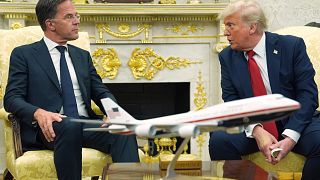Kaïs Saïed
Tunisian professor at the Faculty of Legal Sciences of Tunis, Salwa Hamrouni, says that the exceptional measures made by President Kais Saied that strengthen the powers of his office at the expense of the government and parliament, imply a departure from the framework of the 2014 Constitution.
President Saied's move will effectively replace the government and parliament with rule by decree.
"Now, what we see in this decree, the provisions that are in this decree, change the relationship between the executive and the legislative. Gives all the powers to the Head of State, both the executive and the legislative without ever saying until when these measures will be applied. When I say until when, it is not necessarily a date. It can be an event, for example it can say until an election of a Legislative Assembly. That does not exist." says Hamrouni.
Under the current system most of the executive power was in the hands of the government, and the measures announced by Saied clearly tip the balance in favour of the presidency.
"Legislative texts will be promulgated in the form of decrees signed by the President of the Republic," one of the articles stipulates.
A second article says that "the President shall exercise executive power with the help of a Council of Ministers chaired by a Head of Government".
"The President of the Republic presides over the Council of Ministers and may mandate the Head of Government to replace him/her," says another.
Saied, a political outsider, came to power in 2019 on a wave of public outrage against political parties widely seen as corrupt and self-serving.
Hamrouni insists that "nothing has been done to respect this (2014) Constitution. It is a Constitution that has not stopped being violated since 2014. And so to speak today of the violation of the Constitution by the Head of State as if he were the first to do so, no. I think we should remember that if we are here today. It is precisely because the Constitution has not been applied."
Street protests in early 2011 toppled longtime Tunisian dictator Zine El Abidine Ben Ali, sparking a string of "Arab Spring" revolts across the region, and setting in motion a Tunisian transition to a parliamentary democracy solidified by a 2014 constitution.
Tunisia has won praise for that transition but, more recently, many citizens feel their quality of life has worsened in the face of grinding economic, social and political crises, exacerbated by the coronavirus pandemic.













01:09
Guinea presents draft for new constitution, referendum set for September
00:50
Ons Jabeur retires from Wimbledon Opener due to breathing issues
01:09
Former Tunisian president Moncef Marzouki sentenced to 22 years in absentia
01:02
Tunisian opposition politician Abir Moussi sentenced to two years in prison
01:32
Land convoy leaves Tunisia for Gaza, in an effort to break Israel's siege
Go to video
Sliti proud to be back with Tunisian team but realistic about Africa Cup prospects